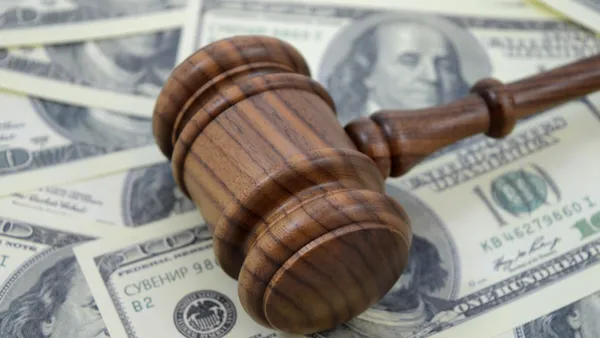UPDATE: Sept. 25, 2020: Financial institutions filed 1,922 suspicious-activity reports (SARs) involving business-loan fraud in August, Bloomberg reported, citing data from the Financial Crimes Enforcement Network (FinCEN). That marks the fourth consecutive month in which the number of SAR filings broke the previous record.
Reports jumped 84% from July's total of 1,044. That number was more than double June's 489. August's total is about 14 times the monthly average FinCEN has seen since it began tracking SARs in 2014.
FinCEN said it couldn't comment to Bloomberg on the reason for the spike in reports but that it has "done extensive work in reaction to COVID-19" and that it has "raised awareness within the financial industry of red flags and targeted scam techniques."
The data itself doesn't spotlight a reason for the swell in reports. But the time frame coincides with a flurry of applications submitted for the Economic Injury Disaster Loan program. The Small Business Administration's inspector general cited the vehicle as a fraud risk in July and called for greater oversight of the program. August also saw the last few days of new activity under the Paycheck Protection Program (PPP).
Dive Brief:
-
Banks filed 1,044 reports of suspected business loan fraud in July, nearly seven times the average monthly number, according to a report published Thursday by the Project On Government Oversight (POGO). July's total was more than double the 489 reports filed in the previous month.
-
That's the highest monthly number of suspected business loan reports in the Financial Crimes Enforcement Network's (FinCEN) database, which dates back to 2014, the report found.
- The spike in suspected fraud comes as the Department of Justice (DOJ) announced Thursday it has charged 57 people with Paycheck Protection Program (PPP) fraud since the coronavirus relief measure's launch in April.
Dive Insight:
Since the PPP's initial rollout in April, the Small Business Administration (SBA) and Treasury Department's program has drawn concern that bad actors would take advantage of the relief meant for struggling small businesses.
The Government Accountability Office (GAO) in June said the number of PPP loans approved, the speed with which they were processed, and limited safeguards left the program open to "significant risk that some fraudulent or inflated applications were approved."
By the time the program closed to new applications Aug. 8, more than 5.2 million of the forgivable loans were made, totaling more than $525 billion, according to the SBA.
The 57 people charged with PPP fraud account for more than $175 million, the DOJ said, adding it has opened "several hundred" PPP-related investigations and identified nearly 500 PPP-related individuals it believes made fraudulent requests to receive the relief funds.
"The amount of fraud that we've uncovered to date is significant," said Brian Rabbitt, acting assistant attorney general of the DOJ's criminal division.
Rabbitt said the department has been able to recover or freeze more than $30 million of fraudulently obtained funds.
"The amount of fraud that we anticipate charging in the future is also significant and given what we've seen so far, we believe that there is an additional set of fraudulent activity out there that we intend to continue pursuing," he said. "While it's difficult to put concrete numbers on it, I do think that there will be plenty of work for us to do in the months going forward."
Dealing with corrupt individuals and such fraudulent activity puts banks at risk, Jay Lerner, the inspector general for the Federal Deposit Insurance Corp. (FDIC), said at a Thursday press conference.
"We will continue to help preserve the integrity of the banking sector," he said. "These complex multimillion-dollar PPP cases send a strong signal, a message of deterrence, that we are determined and vigilant and we will investigate and prosecute those that defraud the government programs, moving money through the banks, especially ones that are funded by American taxpayer dollars."
Meanwhile, after an internal investigation, the country's largest bank has reportedly taken action against its own employees suspected of engaging in coronavirus relief fraud.
JPMorgan Chase fired several employees who improperly applied for and received coronavirus relief funds through another SBA program, the Economic Injury Disaster Loan (EIDL) program, Bloomberg and the Financial Times reported Wednesday.
The bank noticed suspicious amounts of money had been deposited into checking accounts owned by bank employees, a person familiar with the matter told Bloomberg.
Sen. Marco Rubio, R-FL, on Thursday called for JPMorgan Chase CEO Jamie Dimon to provide information on the bank's investigation into the fraud.
"Financial institutions, like yours, are on the frontlines of providing PPP assistance," Rubio wrote in a letter to Dimon. "Allegations that employees of financial institutions have exploited either the PPP or EIDL programs for their own gain must be investigated fully."











